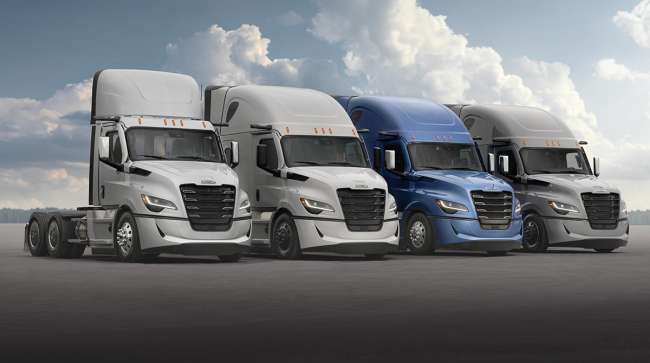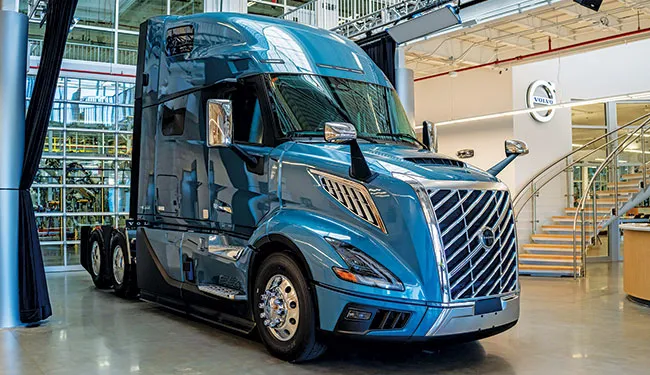Staff Reporter
DTNA Halts New Diesel Truck Sales in Oregon

[Stay on top of transportation news: Get TTNews in your inbox.]
One truck manufacturer has stopped taking orders for new diesel-powered trucks and buses in Oregon and two more are limiting sales there as a result of the state’s implementation of emissions reduction laws mirrored after California’s Advanced Clean Trucks rule.
Daimler Truck North America in late December stopped taking orders for diesel-powered trucks and buses in Oregon — home of its headquarters — Transport Topics has confirmed. The company produces Freightliner and Western Star trucks and Thomas Built Buses.
Rival truck manufacturers Volvo Trucks North America and Mack Trucks, meanwhile, are limiting sales of diesel trucks there in order to comply with the regulations, they told TT. While the two subsidiaries of Sweden’s Volvo Group have not completely halted sales, they noted in separate emails to TT that they had “no choice” but to restrict sales.
Freightliner, Western Star, VTNA and Mack accounted for 126,016 of the 217,872 Class 8 retail truck sales in the U.S. in the first 11 months of 2024, according to Wards Intelligence data.
RELATED: Five States Seek CARB Delays When Regs Take Effect in 2025
DTNA said details received from the Oregon Department of Environmental Quality staff on the provisions of the ACT rule exhibited differences between how California — whose own ACT the Beaver State’s regulations are intended to mirror — and Oregon and are implementing the law.
“Unfortunately, that difference leaves us unable to predict our credit balances in Oregon and therefore risks our compliance in the state. We will work with the [DEQ] to try to resolve this issue — but until we have clarity on the matter, we are regretfully unable to process any orders for combustion-powered vehicles for the state,” the company said in a statement.

Waters
“We want Oregon to interpret the rules in the same way as California does,” DTNA Vice President Product Integrity Sean Waters told TT on Jan. 9.
DTNA’s unease is with credit reporting requirements. California counts sales based off zero-emission vehicle sales codes, while Oregon is using registrations through the state Department of Transportation’s Driver and Motor Vehicle Services Division (DMV).
RELATED: CARB Rules Seen as Hindrance to Obtaining New Diesel Vehicles
“We don’t control where a customer registers a vehicle,” Waters said.
The company wants to continue sales of diesel trucks in Oregon, said Waters, who pointed specifically to the company’s recently updated, fifth-generation Freightliner Cascadia. That truck, which debuted in October at American Trucking Associations’ Management Conference & Exhibition, offers a 1.9% increase in fuel efficiency compared with its immediate predecessor, but a more than 35% improvement compared with the first Cascadias. North America’s best-selling Class 8 rig debuted in 2007.
Truck Parking Club's Evan Shelley discusses how innovative platforms are turning available space into opportunities for reserved parking. Tune in above or by going to RoadSigns.ttnews.com.
DTNA sold more than 1,500 diesel vehicles in Oregon in 2023.
Until the dispute is resolved, eight dealerships in Oregon are unable to sell new Freightliner and Western Star trucks, including five Freightliner Northwest locations and two owned by the Penske Automotive Premier Truck Group unit.
Oregon adopted the ACT rule in November 2021. The regulations apply to all new on-road vehicles with a gross vehicle weight rating greater than 8,500 pounds. The proportion of medium-duty and heavy-duty zero-emission trucks that OEMs must sell rises each year. Zero-emission truck percentages vary by the type of truck. For model year 2025, it is 7% for tractors and 11% for rigid trucks.
Truck makers can generate and bank credits for model year 2022-2024 zero-emission truck sales, which can then be used to comply with the rule.

VTNA's revamped VNL Class 8 tractor. (Volvo Trucks)
DEQ believes it has resolved DTNA’s concerns while admitting there had been a “miscommunication” on its part.
DEQ initially told DTNA it was not seeing certain electric trucks in DMV records, and that DMV registration in Oregon would be required to generate a credit. This was later determined to be inaccurate. A DEQ spokeswoman said in an email that the agency told the truck maker at a Dec. 20 meeting that proof of registration would not be required and was unclear why a pause on sales remains in place given that confirmation.
Since then, discussions have continued, both sides told TT. Waters said Jan. 9 that he had a Jan. 10 meeting scheduled with DEQ on the issue and that the point of contention could be resolved as early as the week starting Jan. 13.
DEQ already tweaked the timeline for compliance with the regulations in November, increasing the deficit makeup period from one model year to three model years and altering compliance requirements to sales of delivered vehicles instead of when the trucks reach the buyer.
Trucking organizations say that is not enough and that DTNA’s pause on sales and the Volvo Group units’ restrictions are symptomatic of rules that require too much too soon, particularly absent the required fueling infrastructure.
Oregon has just one battery-electric charging station at present. Estimates of how many chargers will be required to meet the ACT requirements range from as few as 5,000 to as many as 20,000, according to sources.
Oregon Trucking Associations wants implementation delayed by two years.

Jarvis
“There’s too much uncertainty in this approach,” OTA President Jana Jarvis told TT. “It is too much of a risk for dealerships and OEMs.”
Jarvis said her members were likely to hold on to trucks for longer or consider moving their offices out of the state. “It is hitting everyone’s pocketbook,” she said.
DTNA’s decision was a direct response to the challenges posed by the state’s adoption of the mandate, said ATA spokesperson Jessica Gail, adding that the pause underscores the significant economic burdens the regulations impose on both manufacturers and consumers alike.
Among other major truck manufacturers, Kenworth and International Motors told TT they would continue to sell diesel trucks in Oregon. Kenworth’s fellow Paccar subsidiary, Peterbilt, declined to comment.
Want more news? Listen to today's daily briefing below or go here for more info:





